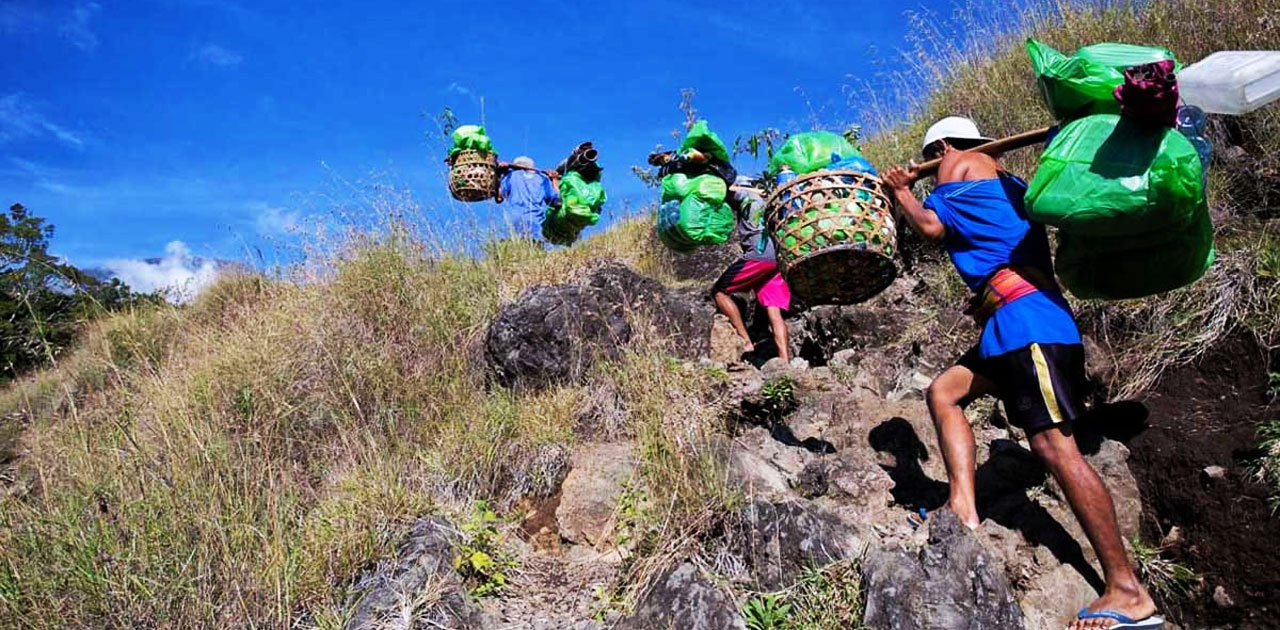The Rinjani trek is a challenging mountain walk and you must be prepared with good equipment, warm and windproof clothing. Rinjani can attract severe storms, lightening and strong winds. When the weather is settled, the sun is intense and the nights frosty. Parts of the trail are steep and slippery. Beware of bad weather and risks of exposure to the wet and cold (hypothermia). If caught in an electrical storm, take shelter and avoid prominent ridges. Beware of stinging insects and plants. Leeches can be a nuisance in the wet season.
Volcanic Hazards: Although Mt.Rinjani has not erupted in recorded history, Mt.Baru (2,351m) in the crater lake is an active volcano. It last erupted dramatically in 1994. Check the notice boards for recent hazards, and take advice from park staff and guides.
Spring Water: Fresh water springs are a feature of the trek and determine campsites. Your guide know where these are. During the drier months (July – September) some springs completely disappear. Park staff and guides constantly monitor these water sources to determine their abundance.
Park Fees: Fees are paid at the Rinjani Trek Center at Rp. 150,000 (15$) /person/entry. They contribute to the protection, maintenance and management of the national park, rinjani trek route, village attractions and visitor facilities.
Guides and Porters: We hire only professional mountain guide and porters from the nearest villages in the area of Rinjani National Park who has pass the guiding and handling test and hold a valid guide license. Lombok Network is keen to develop the Eco Tourism Concept, giving as much as benefit to the local community to improve their standard of living. 5% from the net income is donated to support education for the poor children in isolated villages.
Our Philosophy: We deal largely in ecotourism & adventure travel, but for us adventures are not just the rugged kind. An adventure can take many forms and need involve little that is overly strenuous – to us every trip is a voyage of discovery and hence an adventure. The guiding philosophy behind each is that the trip be environmentally friendly and sustainable. This means impacting as little as possible on the peoples and places we visit, always respecting the distinctiveness and special qualities of each.
- To sum up, we try:To learn from nature & other cultures
- To minimize impact on the natural & cultural environments
- To return something to the local community
- To facilitate self-determination for native peoples
- To promote sustainable tourism
- To have fun
The way we do it must be environmentally-friendly as well as economically and physically efficient. This means we trek, cook, camp and shows you more of the things with care and attentions. We use mechanized transport when we have to cover long distances in limited time; even so, we use local modes of transportation as far as possible to maximize exposure to the local lifestyles and to get close to the people. As a consequence, during the tours there is a lot of opportunity to learn about and from the indigenous peoples.
You are advised to ensure that your guide is carrying a radio handset or mobile phone. Our trek programme equipped with two ways radio communication. In a group of minimum 6, we also provide a dinning tents, emergency lamp, trek leader, rangers or Save And Rescue (SAR) team if necessary.
Telephone Communication: Cell phone (GSM) covers most area of Rinjani National Park. Most guide carry their own mobile phone. Not all cellular operators can be used. Pro XL is recommended.
About Us
 We live and born in the village of Senaru, a village located at the foot of Mount Rinjani. A village which has a beautiful nature with views of rice fields, forests, waterfalls and also the beauty of Mount Rinjani Lombok.
We live and born in the village of Senaru, a village located at the foot of Mount Rinjani. A village which has a beautiful nature with views of rice fields, forests, waterfalls and also the beauty of Mount Rinjani Lombok.Get In Touch
WhatsApp
![IMG_20230228_131706[1] Nemoe Trekker](https://www.nemoetrekker.com/wp-content/uploads/2023/03/IMG_20230228_1317061.jpg)

